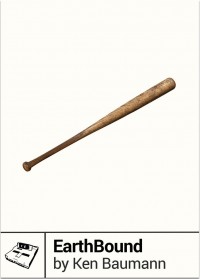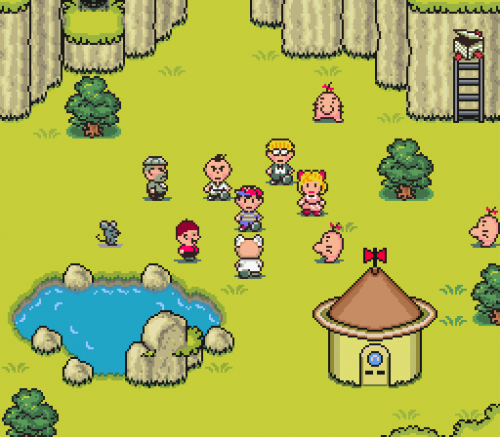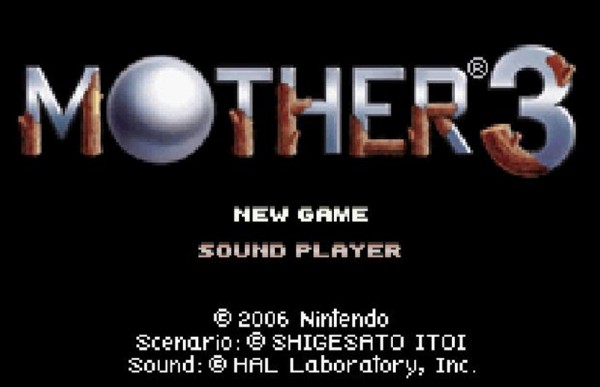25 Points: EarthBound by Ken Baumann
 Earthbound
Earthbound
by Ken Baumann, Foreword by Marcus Lindblom
Boss Fight Books, 2014
191 pages / $14.95 Buy from Boss Fight Books
1. This past December found me at several Christmas parties and office get-togethers (mostly with my wife’s coworkers and friends). Because I’m kind of self-absorbed and, even if I wasn’t, I’ve been spending the past five months with my newborn son, I don’t have much to contribute by way of conversation, so I turned to talking about Earthbound.
2. My parents never bought me a Super Nintendo or any of the other 90’s child indulgences (although I was a member of the Burger King Kid’s Club and was allowed to watch hour upon hour of Nickelodeon), so I had no point of reference for the cult-hit video game.
3. I had trouble finding anyone who knew what I was talking about. They had never heard of the game, and cared even less about Ken Baumann’s book.
4. The few times that I actually found someone who played Earthbound our conversations were hauntingly simple.
5. Me: Have you ever played Earthbound?
Partygoer: You need to go home tonight and play it right now. [End of conversation.]
6. I never got around to it. Blah-blah work. Blah-blah new parent. Blah-blah smartphone.
7. But the real reason why I didn’t play it was because of how purely pleasurable Baumann’s book is.
8. Ken Baumann’s Earthbound is a charming intermingling of videogame history, walkthrough, memoir, and philosophy. He serves as Virgil to the reader’s Dante as he guides us through the “total inverse of Dante’s Hell” that is Twoson, Threed, Summers, and the other locales of the game while drawing on everything from Straw Dogs and Jung to Gak’s role in 90’s gross-out culture and House.
9. Baumann depicts the “irretrievable beauty in video games…” as a Romantic would depict vernal wood. As sacred: “Ephemeral glitches that point to the sublime. Randomized variables that are made more poetic in their expression by their adjacency to the rote and the banal.”
10. The strongest of Baumann’s threads are the biographical ones. Earthbound [the book] is a study of how Earthbound [the game] impacts lives, especially the lives of little Kenny in Texas, his estranged brother Scott, and the support of Ms. Baumann, and the loving Aviva. READ MORE >
January 23rd, 2014 / 4:43 pm
Mother 3: An Appreciation
So, uh, hi. My name is Mike. Today I’m going to talk about the most moving experience I’ve ever had with a video game.
On June 5, 1995, a game called EarthBound was released in the US. It was a Super NES role playing game (RPG) that immediately stood out for its unusual setting: while most RPGs took place in fantasy worlds with princesses, dragons, and the occasional magic-powered WarMech, EarthBound took place in an off-kilter version of the contemporary US. Instead of villages, EarthBound had cities. Instead of sword-wielding warriors, it had children with baseball bats and yoyos. Instead of healing your characters with magic potions, you fed them pizza and French fries. And instead of earning cash by killing monsters and rifling through their pockets, you got an allowance, which you could withdraw from any ATM. You saved your progress by calling your father and telling him about your day. You still did fight monsters, of course, and the game’s hero had psychic powers. It was a fun, silly little game with a surprisingly moving ending. The game sold poorly in the US (and with the sort of brilliant marketing team that thought “This game stinks!” would be a good slogan, I wonder how that happened), but the people who liked it tended to really like it. A little too much, maybe. READ MORE >
Salvatore Pane on Earthbound

An awesome appreciation of one of my three favorite video games & media experiences. (others: Chrono Trigger & Final Fantasy VI (or III on the version I had))

